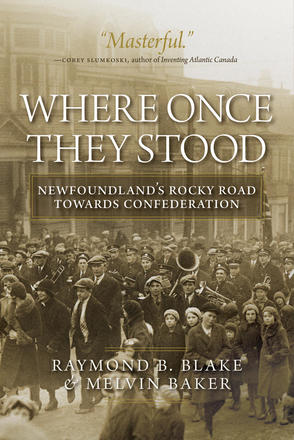Top Choice
Where Once
They Stood is arguably the most significant work on modern Newfoundland and Labrador political history in more than 30 years.
The fact that it has been largely ignored in popular conversation in this the 70th anniversary year of Confederation is an affirmation of its significance.
Raymond Blake and Melvin Baker Decisively repudiate decades of mythology about Confederation. The show that voters fully understood the
issues at stake in both the 1869 election and in the 1948 referenda.
Baker and Blake argue that women were instrumental in determining the outcome, in 1948, believing it provided the best
opportunity for their children.
Invisible no more
James Candow's new history of the Royal Newfoundland Companies in the early and mid- 19th century fills an important gap in both the military and political history of Newfoundland at a crucial time in its history.
The two histories are intertwined, culminating in the election riots of 1861 when members of the Royal
Newfoundland Companies opened fire on a crowd of rioters, killing three and
wounding others. The political compact that grew out of that election shaped Newfoundland politics and society into the twentieth century and continue to echo today.
"In The
Invisibles, James E. Candow provides the fascinating back story of the Royal Newfoundland
Companies while enhancing our understanding of the role they played in
Newfoundland history and the lives of our communities."
The Invisibles is an inadvertent companion to Baker and Blake's examination of Confederation.
A new Robert Bond biography
Jim Hiller's biography of Robert Bond brings together elements of the story of Newfoundland's best known pre-Confederation prime minister that have been scattered through other works over the past four decades.
Hiller succeeds in his goal of placing Bond in the proper context of events during his political career while providing a fair assessment of the man and his performance.
Bond served in or led administrations through the 1890s and the first eight years of the 20th century. It was, as the ISER blurb describes it, "an era
filled with challenges that still resonate today."
Bond is most commonly associated with external affairs, primarly the struggle to negotiate free trade with the United States, to bring an end to the French Shore, and, generally, to deal successfully with imperial powers in
London whose priorities could vary greatly from those in Newfoundland."
While we are still waiting for fresh eyes to look at Newfoundland's external relations from the 1890s through to the Great War and the early 1920s, Hiller provides as thorough and fair treatment as one may find of one of the main figures in Newfoundland history and the time in which he lived.
-srbp-






